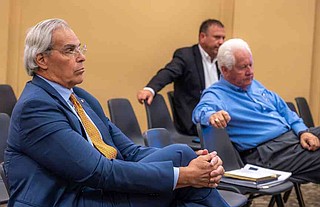Last week, my wife and I hosted a visit from a longtime friend whom I met before starting elementary school and have known ever since.
Before he arrived, we agreed that, since we have different opinions on issues in the political arena, we should avoid discussing politics while he was here.
We knew there were increasing numbers of family members, friends, and acquaintances who are not on speaking terms due to strongly held and diametrically opposing political positions.
Instead of discussing politics, our time together was filled with talking about a wide range of other matters.
We talked about where he and I grew up, the schools we attended, and all the changes that have occurred there.
We also discussed the challenges and opportunities we experienced with raising a family and long-distance relocations made necessary by job changes.
We talked about other childhood friends who died too soon and those who have recently died or are experiencing serious health problems.
Before his visit ended, we decided with some trepidation to discuss politics.
We did so with five rules:
Listen respectively to other points of view, even if we disagree strongly with them.
Embrace the idea that listening is more than waiting for your turn to talk.
End every discussion on strongly held differences of opinion with “you may be right.”
Not all discussions are a debate with a winner and a loser.
Disagree without being disagreeable.
Following our rules was not always easy.
It was always worthwhile and meaningful.
For example, we discovered that we shared common ground with deep concerns over the steadily decreasing levels of civil discourse in our society.
As a result, shortly before my friend left to return home, we discussed Robert Putnam’s book “Bowling Alone: The Collapse and Revival of American Community.”
Written 25 years ago, Bowling Alone is still relevant today.
The book’s unusual title is based on Putnam’s research showing the number of people who bowl alone had increased, but those who bowl in leagues had decreased.
He suggested that when people bowl alone, they do not have opportunities to participate in the social interaction and civic discussions that might occur in a bowling league environment.
Putnam also wrote about the measurable declines in membership and participation in religious organizations, labor unions, parent–teacher associations, military veterans’ organizations, fraternal organizations, and community service organizations.
Putnam did acknowledge that some organizations and issue advocacy groups had increased their membership rolls, but they rarely focus on fostering face-to-face interactions that build what Putnam called social capital.
Instead, they focus on fundraising, collecting dues, marketing services, lobbying, and sending periodic news updates to their members.
Putnam also drew a distinction between two different, but equally important types of social capital.
One type is “bonding,” which occurs within a homogenous demographic group.
The other type is “bridging,” which unites people from different groups.
Putnam concludes a lack of social capital undermines the active civic engagement that a strong democracy requires from its citizens.
I now know my friend’s visit was more than a get-together to talk over old times, catch up on current times, and ponder on the future.
In all our discussions, including those with civil discourse on politics, we built social capital.
It was an unexpected opportunity to think about and evaluate what I can be and should be doing to help address the lack of civil discourse and to help increase social capital in our society.
The answer is clear.
Going forward, I must consistently strive to:
Respectively consider all points of view.
Listen with more than waiting for my turn to talk.
Say regularly “you may be right.”
Limit discussions as debates.
Disagree without being disagreeable.
Always look for opportunities to build social capital.
David Reel is a public affairs and public relations consultant. He is also a consultant for not – for – profit organizations on governance, leadership, and management matters. He lives in Easton.



Justin White says
Social Capitol has been replaced by Social Media. The sometimes lengthy and considered process of people sharing thought in person has been replaced by people clicking a share button on memes without even taking the time to consider the substance and implications of the meme. This entire shift is driven by commercial interests of the ‘social’ platforms for advertising revenue, with no editorial controls or responsibility. And upon instantaneously sharing a meme, human defensiveness begins to adopt concepts that are simplistic at best, intentionally manipulative more often, forming echo chambers that are nearly impossible to psychologically break out of for most people trying to be ‘social’ in the few seconds they have to click a few buttons.
A conversation such as yours is very rare now, and though your suggestions are noble, im afraid the ‘train has left the station’.